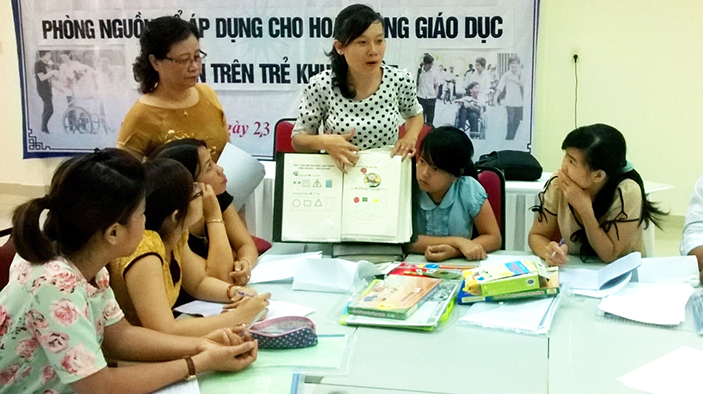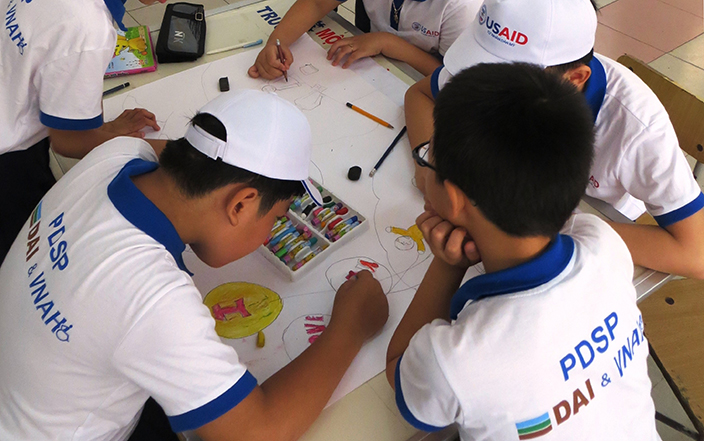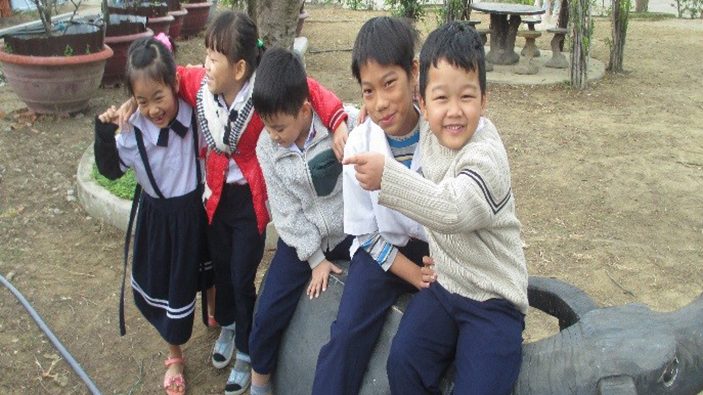DEVELOPMENTS
In Vietnam, Creating Opportunities for Children with Disabilities
Dec 3, 2015
Even though their right to an education is mandated by law, thousands of school-age children in Vietnam stay at home or sit uninvolved in classrooms because they have disabilities. Helping these children has been a priority of the U.S. Agency for International Development’s disability program in Vietnam, including its Persons with Disabilities Support Program (PDSP), launched in 2012 and led by DAI.
PDSP’s initial assessment in Danang, where the project is headquartered, found many gaps in the capacity of schools, administrators, and teachers to host disabled kids. We embarked with our local partner, the Danang Department of Education and Training (DOET), on a broad initiative to renovate classrooms, educate educators and parents, and, ultimately, get more special-needs children into well-prepared classrooms.

Among the results so far: more than 600 teachers—and 100 parents—have been trained to support children with disabilities, and nearly 1,000 children are receiving financial assistance for inclusive education or special education, including nearly 200 entering school for the first time.
These young people—who may suffer from deafness, cerebral palsy, or other physical and developmental disabilities—will now have a better chance to become self-sufficient, productive, and employable, contributing to their communities while lessening the burden of support on families and others. But these results, and those to come, have been achieved in the face of some difficult institutional and attitudinal barriers we encountered along the way.
Teaching the Teachers
Many schools in the central coastal city of Danang (population 1 million) lacked the staff and facilities to serve children with disabilities, but widespread skepticism and a lack of information also prevailed. Many teachers worried about the extra attention that disabled students would require. Many parents did not know of their children’s right to attend school, or how to supplement their development at home.
PDSP supports professional training for teachers and renovation for schools. We facilitated training on how to mainstream children with disabilities. We also enrolled 44 teachers in a second bachelor’s degree program on inclusive and special education through the Ho Chi Minh City University of Education. While these teachers worked toward their degrees, PDSP and DOET advocated to the head of the local government—the Danang People’s Committee—for additional teachers to maintain the quality of teaching; from this pool, seven qualified special education teachers were discovered and hired.

The development of Individual Education Plans and an adjusted curriculum in “inclusive” schools enabled children with disabilities to perform better. Consultants from Vietnam’s Institute of Educational Sciences developed tools on assessing these children’s qualitative progress in mathematics, reading, and writing, tools that were first piloted and are now widely used in Danang.
Many schools lacked facilities that catered to disabled students. PDSP provided resource rooms equipped with interactive learning equipment tailored to special learning needs and abilities. New resource rooms at five primary schools were established and two existing resource rooms equipped, including with computers, projectors, and shelves to hold teaching materials, so 75 children with disabilities from these and neighboring schools could be tutored.
A team of teachers also identified 77 out-of-school children who were then enrolled in three special education schools: Nguyen Dinh Chieu (35 students), Tuong Lai (31 students), and Thanh Tam (11 students). Two schools—Nguyen Dinh Chieu and Tuong Lai—lacked facilities and staff to handle these new enrollments, prompting PDSP to upgrade and equip their classrooms. The project also supported stipends for the new students to cover meals, uniforms, school bags, and other boarding school supplies.

Mainstreaming the Disabled
PDSP is a comprehensive program. In addition to our education initiative, our team supports an integrated case management, social work, and referral system for people with disabilities that will be sustained by local government. We are improving the quality of and access to specialized services, and enhancing public health services to improve systems for birth defects surveillance, postnatal newborn screening, and pre-conception care, among other activities.
While training and renovation laid the groundwork for increased student attendance, PDSP and DOET knew we also had to educate the public on the importance of inclusive education. We developed and disseminated educational materials and promotional banners to households, schools, and communities. With PDSP support, DOET worked with Danang radio and television stations to produce a 30-minute program about services for children with disabilities, and developed leaflets on peer support to encourage students to support their classmates with disabilities.
These campaigns were designed to help neighborhoods support children with disabilities as well as decrease discrimination, bullying, and stigmatization in mainstream schools, thereby increasing these students’ self-esteem and confidence in learning.
Prospects for Sustainability and Impact
PDSP ends in January 2016. The technical and financial support provided so far by DOET and the Danang People’s Committee for PDSP-led initiatives indicates a strong potential for longer-term government commitment and support. We have been collaborating with our partners on a strategy to sustain PDSP’s contributions and ensure they are included in budget requests for the city’s new five-year Disability Action Plan.
Recommendations
- Continue raising awareness on the rights of children with disabilities to education and involve all social sectors in mobilizing children with disabilities to school.
- Support development of a general education system that is inclusive of all children.
- Improve training for teachers and school administration. Support development of core standards for education provision for children with disabilities, such as adjusted curriculum and grading.
- Ensure that progress and achievements of children with disabilities are acknowledged in the education system.
- Increase communication between schools and parents to exchange results and adjust learning plans as needed.
- Increase related monitoring and evaluation of the education system.